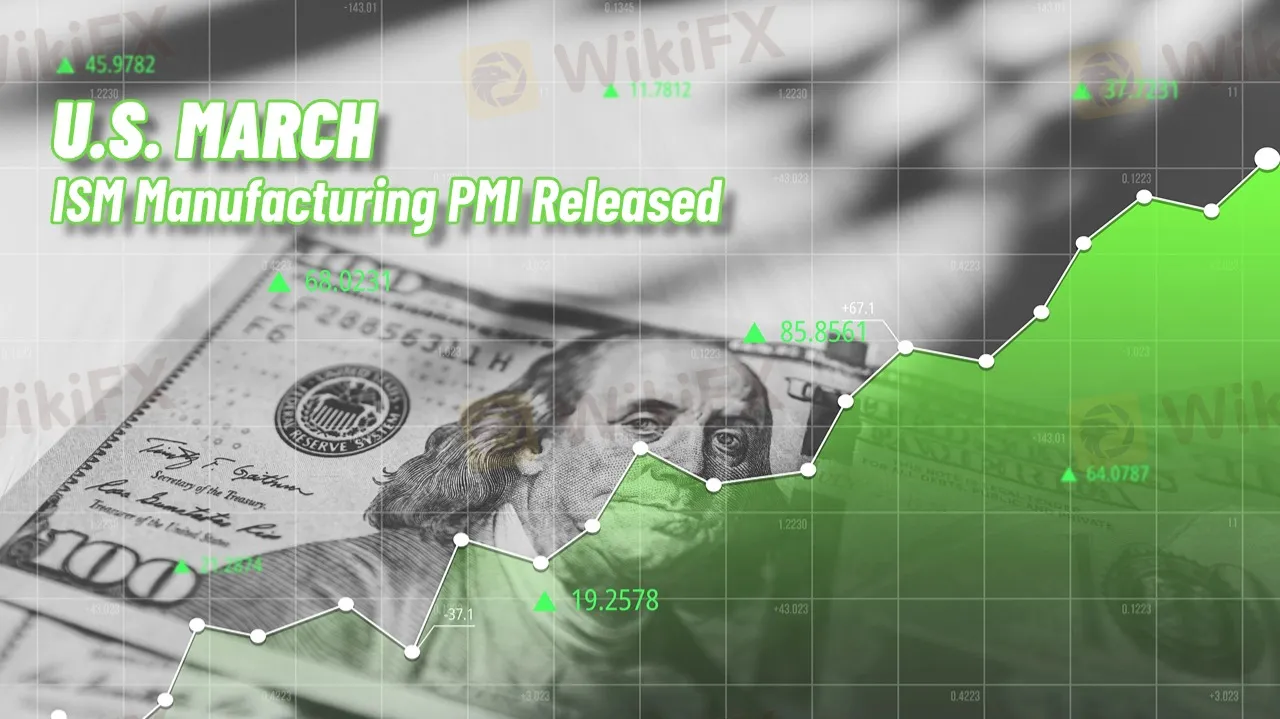简体中文
繁體中文
English
Pусский
日本語
ภาษาไทย
Tiếng Việt
Bahasa Indonesia
Español
हिन्दी
Filippiiniläinen
Français
Deutsch
Português
Türkçe
한국어
العربية
U.S. March ISM Manufacturing PMI Released
Abstract:The U.S. March ISM Manufacturing PMI data shows that manufacturing has contracted for the first time, and investors should pay attention to future changes and impacts on the sector.

According to the ISM manufacturing PMI data released on April 1, the U.S. manufacturing sector has contracted for the first time, with the price index surging, indicating the risk of an economic slowdown. Investors should closely monitor future developments and impacts on manufacturing.
The March ISM manufacturing PMI dropped to 49, lower than the expected 49.5 and down from 50.3 in February. A reading of 50 is considered the dividing line between expansion and contraction, meaning U.S. manufacturing is experiencing a downturn. At the same time, the price index rose sharply by 7 points to 69.4, reaching its highest level since June 2022. This increase highlights growing production cost pressures, especially from rising raw material prices.
The weakness in factory orders and employment indicators further emphasizes the impact of insufficient demand on the manufacturing sector, with the factory orders index falling to 45.2, the lowest level since May 2023.
These data suggest that the challenges facing U.S. manufacturing are intensifying, particularly due to the dual effects of tariff policies and weak demand. While certain industries are still showing growth, the overall signs of economic slowdown are becoming more pronounced, and the outlook for manufacturing is not optimistic.
For investors, the current market is filled with uncertainty, and it is essential to adjust investment strategies prudently. Focus on defensive sectors, such as utilities and consumer staples, which may offer more stable returns.
Meanwhile, the commodity market, especially metals and energy commodities, may be impacted by price fluctuations, and investors should assess risks and consider appropriate investment opportunities. Future economic data will be key to assessing the direction of the economy.

Disclaimer:
The views in this article only represent the author's personal views, and do not constitute investment advice on this platform. This platform does not guarantee the accuracy, completeness and timeliness of the information in the article, and will not be liable for any loss caused by the use of or reliance on the information in the article.
Read more

Scammers Use AI to Fake Lim Guan Eng’s Support for Investment Scheme
A fake video showing former Penang Chief Minister Lim Guan Eng promoting an investment scheme has started spreading online. Lim has come forward to say the video is not real and was made using artificial intelligence (AI).

IronFX: A Closer Look at Its Licences
In an industry where safety and transparency are essential, the regulatory status of online brokers has never been more important. For traders seeking to protect their capital, ensuring that a platform operates under recognised and stringent oversight can make all the difference. Keep reading to learn more about IronFX and its licenses.

OctaFX and XM Trading Platforms to Be Blocked in Singapore
OctaFX and XM will be blocked in Singapore for offering unlicensed trading services, breaching local regulations. Access will be restricted from June 2025.

ATFX Opens New Office in Cape Town's Portside Tower to Expand in Africa
ATFX inaugurates a new office in Cape Town, marking a key milestone in its African expansion, with dedicated teams to enhance local trading services.
WikiFX Broker
Latest News
IronFX Broker Review 2025: A Comprehensive Analysis of Trustworthiness and Performance
OctaFX Flagged by Malaysian Authorities
OctaFX and XM Trading Platforms to Be Blocked in Singapore
Nonfarm Data Lifts Market Sentiment, U.S. Stocks Rebound Strongly
ATFX Opens New Office in Cape Town's Portside Tower to Expand in Africa
Tighter Scrutiny: Finfluencers Face Global Crackdown Amid Rising Risks
Interactive Brokers Enhances PortfolioAnalyst with New Features
2025 Broker Real - World Reviews: Share Your Insights & Grab Thousands in Rewards!
Why Your Worst Enemy in Trading Might Be You
Errante Broker Review
Currency Calculator


